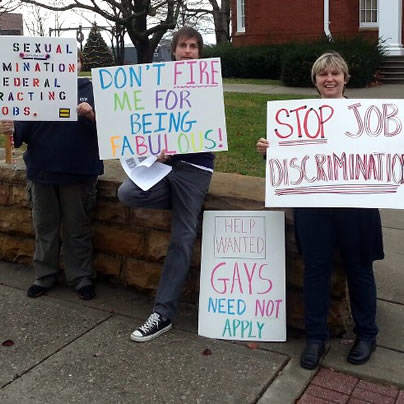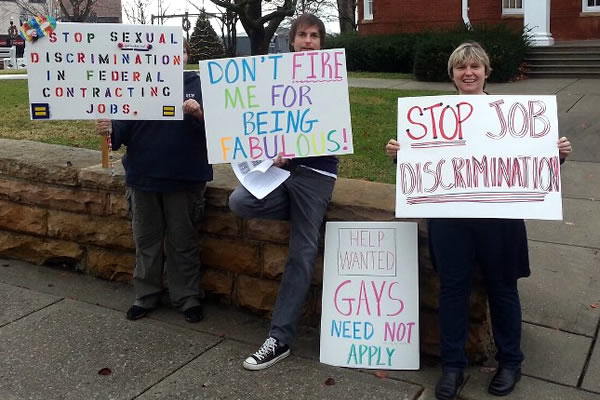National
Tenn. activists rally for ENDA executive order
Sanders faults nat’l groups for not providing strategy


Barbara Stover (left), Darren Crawford (center) and Janet Moore protest for employment protections in Cookevile, Tenn. (photo by R.G. Cravens)
Faced with living in a state with no non-discrimination law protecting them, LGBT activists demonstrated in three Tennessee cities on Sunday to call on President Obama to issue an executive order barring federal contractors from engaging in job bias based on sexual orientation and gender identity.
Chris Sanders, president of the Tennessee Equality Project, said he organized the demonstration as part of 24 Tennessee groups because of a law signed last year by Gov. Bill Haslem (R) prohibiting cities from passing LGBT non-discrimination ordinances. That measure rescinded a contractor non-discrimination ordinance that passed a couple months earlier in Nashville.
“We had experienced in 2011 Nashville passing a contractor non-discrimination ordinance only to have the state nullify it,” Sanders said. “So, we have no option but this executive order and ENDA ahead of us in Tennessee. We have no hope for getting state employment protections at the state level when now we can’t even pass them in our city.”
The Obama administration has thus far withheld issuing an executive order along these lines. Just last week, White House Press Secretary Jay Carney said Obama prefers legislation known as the Employment Non-Discrimination Act because that measure would “provide lasting and comprehensive protections for LGBT people across the country regardless of whether they happen to work for a government contractor.”
A White House spokesperson declined to comment over the weekend about the Tennessee demonstration.
Protestors demonstrated at the three places in Tennessee: in front of the federal building in Memphis; in front of the Putnam County Courthouse in Cookeville and the War Memorial Plaza in Nashville. Sanders estimated that a total of 115 people showed up for the rallies: 30 in Memphis; 15 in Cookeville and 70 in Nashville.
The Tennessee Equality Project has also launched an online petition at the White House website calling on Obama to issue the executive order. As of Sunday evening, the petition had 4,700 signatures. If a total of 25,000 people sign the petition by Wednesday, the White House will issue an official response.
“If this item is signaled as a priority in our movement, which is what we’ve been reading, then we as our community ought to be showing that it’s important to us,” Sanders added. “That’s why did these rallies, that’s why we started the petition.”
Sanders didn’t limit his protest to the White House, but faulted national groups and bloggers for not providing a strategy to build grassroots support for the executive order, saying local activists “haven’t really been given marching orders of what we’re all supposed to be doing to get it done.”
“I would think that either the national bloggers or the national organizations that serve our community would have put together some public strategy for building support for it,” Sanders said. “I know they’re lobbying to get things going along, and we think that’s absolutely critical. We do that at the state and local level and we know the value of that, but you also have to build public support, and we haven’t seen a lot of that.”
Sanders declined to identify which national groups and bloggers weren’t doing enough on the executive order, but said he sent out the news release and didn’t find much interest.
“We’re just hoping that other states begin movement because we’re not getting a clear signal at the national level of what we’re supposed to be doing,” Sanders said. “Again, I thought the signal was clear that it’s a priority, but we’re supposed to do, that’s been ambiguous, so we just took matters into our own hands here.”
Tico Almeida, president of the national LGBT group Freedom to Work, said he agrees “it’s important to build public support for the executive order in addition to traditional lobbying” and said he undertook efforts to collaborate with the Tennessee activists and alert media about the demonstration.
“We were very glad to receive an email this weekend with a press release about the Tennessee rallies for the executive order, and we wrote back to Chris Sanders to offer our help getting the word out,” Almeida said. “We then forwarded the press release to the Washington Blade so that the Tennessee efforts could get news coverage. We are very eager to collaborate with any state or local LGBT organizations interested in pushing for the executive order and for ENDA the statute.”
The Human Rights Campaign, another national LGBT group calling for the executive order, didn’t respond to a request to comment on Sanders’ remarks.

Gray Alexander addresses the rally for employment non-discrmination protections in Nashville (photo courtesy Chris Sanders)
In addition to having a law prohibiting cities from passing non-discrimination ordinances, Tennessee has no state law on the books protecting LGBT people against job bias in the workforce. LGBT people in the state would need either federal action for protection, such as the executive order or passage of ENDA.
Among those demonstrating was Gray Alexander, who’s 15 and co-president of the gay-straight alliance at Martin Luther King, Jr., Magnet High School in Nashville.
Alexander, who identifies as pansexual, said he participated in the protest because he says the executive order is “the only way for us to get equality in the workplace.”
“It’s frustrating,” he said. “It’s an important thing that needs to happen for all our states. There’s no need discrimination based on gender identity and sexual orientation in the workplace anywhere in the U.S., or anywhere in the world.”
Alexander said he hasn’t personally been the victim of discrimination in employment, but says harassment of LGBT students in commonplace within his school.
“My school is a much more progressive school than other schools in the state, but there’s obvious discrimination based on sexual orientation,” Alexander said. “It’s not as confrontational as a lot of other places. A lot of it is just calling someone ‘gay’ or ‘faggot’ behind their back, or pointing at them as they walk by.”
Kal Dwight, who’s 21 and a transgender Memphis resident, said he demonstrated because as a volunteer at the Memphis Gay & Lesbian Community Center he’s seen employment discrimination against transgender woman.
“They definitely have a really hard time getting a job anywhere,” Dwight said. “Anytime we can get them more protections is good — especially here in the African-American community.”
Despite the stated reluctance on behalf of the White House, Dwight was optimistic that Obama would issue an executive order protecting LGBT workers.
“I think he’s going to do it; I just don’t think he’s going to do it right this second,” Dwight said. “I have faith that he’s going to do it.”
A prominent incident of alleged LGBT employment discrimination in Tennessee has occurred in recent years.
Former Belmont University head soccer coach Lisa Howe in 2010 may have been dismissed from her post because she’s a lesbian.
At the time, Howe and her partner were expecting a baby. After the Christian college denied her permission to share this information with her team, Howe resigned. According to an article in The Huffington Post, those familiar with the situation alleged Belmont University told Howe her sexual orientation wasn’t consistent with the school’s values and she’d would have to resign or be fired.
The school ultimately sent out a statement saying her removal was a mutual decision between officials and Howe.
According to a search on USASpending.gov, Belmont University is a federal contractor. However, as a Christian-affiliated school, the college may be still free to discriminate against LGBT workers even under ENDA or an executive order barring workplace discrimination because of the religious exemption.
Alexander recalled that incident and said the loss of Howe’s job was “unacceptable” — particularly because she did exceptional work as the soccer coach for the school.
“They went from losing professionally and to a winning season, and so then she wanted to come out, and she quit for working for them,” Alexander said. “The fact that she had to leave because she was gay, even though she was phenomenal soccer coach is really frustrating. Her track record didn’t make up for that fact that she was gay.”
According to the news release for the protests, a coalition of 24 Tennessee-based groups organized the demonstrations: Austin Peay State University Gay/Straight Alliance, Out & About Newspaper, Tennessee Tech Lambda, Tennessee Transgender Political Coalition, Nashville GLBT Chamber of Commerce, PFLAG Nashville, Greater Nashville Prime Timers, GLSEN Middle TN, Metro Human Relations Commission, Nashville Pride, OutCentral, Just Us at Oasis Center, PFLAG Maryville, Human Rights Campaign Nashville Steering Committee, CHOICES: Memphis Center for Reproductive Health, Vanderbilt Lambda Association, Tennessee Democratic Party, Latino Memphis, First Congregational Church Memphis Planned Parenthood Greater Memphis Region, Shelby County Democratic Party, Memphis Gay & Lesbian Community Center, Perpetual Transition, Tennessee Friends of People’s World and Tennessee Citizen Action.
New York
Two teens shot steps from Stonewall Inn after NYC Pride parade
One of the victims remains in critical condition

On Sunday night, following the annual NYC Pride March, two girls were shot in Sheridan Square, feet away from the historic Stonewall Inn.
According to an NYPD report, the two girls, aged 16 and 17, were shot around 10:15 p.m. as Pride festivities began to wind down. The 16-year-old was struck in the head and, according to police sources, is said to be in critical condition, while the 17-year-old was said to be in stable condition.
The Washington Blade confirmed with the NYPD the details from the police reports and learned no arrests had been made as of noon Monday.
The shooting took place in the Greenwich Village neighborhood of Manhattan, mere feet away from the most famous gay bar in the city — if not the world — the Stonewall Inn. Earlier that day, hundreds of thousands of people marched down Christopher Street to celebrate 55 years of LGBTQ people standing up for their rights.
In June 1969, after police raided the Stonewall Inn, members of the LGBTQ community pushed back, sparking what became known as the Stonewall riots. Over the course of two days, LGBTQ New Yorkers protested the discriminatory policing of queer spaces across the city and mobilized to speak out — and throw bottles if need be — at officers attempting to suppress their existence.
The following year, LGBTQ people returned to the Stonewall Inn and marched through the same streets where queer New Yorkers had been arrested, marking the first “Gay Pride March” in history and declaring that LGBTQ people were not going anywhere.
New York State Assemblywoman Deborah Glick, whose district includes Greenwich Village, took to social media to comment on the shooting.
“After decades of peaceful Pride celebrations — this year gun fire and two people shot near the Stonewall Inn is a reminder that gun violence is everywhere,” the lesbian lawmaker said on X. “Guns are a problem despite the NRA BS.”
New York
Zohran Mamdani participates in NYC Pride parade
Mayoral candidate has detailed LGBTQ rights platform

Zohran Mamdani, the candidate for mayor of New York City who pulled a surprise victory in the primary contest last week, walked in the city’s Pride parade on Sunday.
The Democratic Socialist and New York State Assembly member published photos on social media with New York Attorney General Letitia James, telling followers it was “a joy to march in NYC Pride with the people’s champ” and to “see so many friends on this gorgeous day.”
“Happy Pride NYC,” he wrote, adding a rainbow emoji.
Mamdani’s platform includes a detailed plan for LGBTQ people who “across the United States are facing an increasingly hostile political environment.”
His campaign website explains: “New York City must be a refuge for LGBTQIA+ people, but private institutions in our own city have already started capitulating to Trump’s assault on trans rights.
“Meanwhile, the cost of living crisis confronting working class people across the city hits the LGBTQIA+ community particularly hard, with higher rates of unemployment and homelessness than the rest of the city.”
“The Mamdani administration will protect LGBTQIA+ New Yorkers by expanding and protecting gender-affirming care citywide, making NYC an LGBTQIA+ sanctuary city, and creating the Office of LGBTQIA+ Affairs.”
U.S. Supreme Court
Supreme Court upholds ACA rule that makes PrEP, other preventative care free
Liberal justices joined three conservatives in majority opinion

The U.S. Supreme Court on Friday upheld a portion of the Affordable Care Act requiring private health insurers to cover the cost of preventative care including PrEP, which significantly reduces the risk of transmitting HIV.
Conservative Justice Brett Kavanaugh authored the majority opinion in the case, Kennedy v. Braidwood Management. He was joined by two conservatives, Chief Justice John Roberts and Justice Amy Coney Barrett, along with the three liberal justices, Sonia Sotomayor, Elena Kagan, and Ketanji Brown-Jackson.
The court’s decision rejected the plaintiffs’ challenge to the Affordable Care Act’s reliance on the U.S. Preventative Services Task Force to “unilaterally” determine which types of care and services must be covered by payors without cost-sharing.
An independent all-volunteer panel of nationally recognized experts in prevention and primary care, the 16 task force members are selected by the secretary of the U.S. Department of Health and Human Services to serve four-year terms.
They are responsible for evaluating the efficacy of counseling, screenings for diseases like cancer and diabetes, and preventative medicines — like Truvada for PrEP, drugs to reduce heart disease and strokes, and eye ointment for newborns to prevent infections.
Parties bringing the challenge objected especially to the mandatory coverage of PrEP, with some arguing the drugs would “encourage and facilitate homosexual behavior” against their religious beliefs.
-

 U.S. Supreme Court4 days ago
U.S. Supreme Court4 days agoSupreme Court upholds ACA rule that makes PrEP, other preventative care free
-

 U.S. Supreme Court4 days ago
U.S. Supreme Court4 days agoSupreme Court rules parents must have option to opt children out of LGBTQ-specific lessons
-

 National5 days ago
National5 days agoEvan Wolfson on the 10-year legacy of marriage equality
-

 Congress5 days ago
Congress5 days agoSenate parliamentarian orders removal of gender-affirming care ban from GOP reconciliation bill












